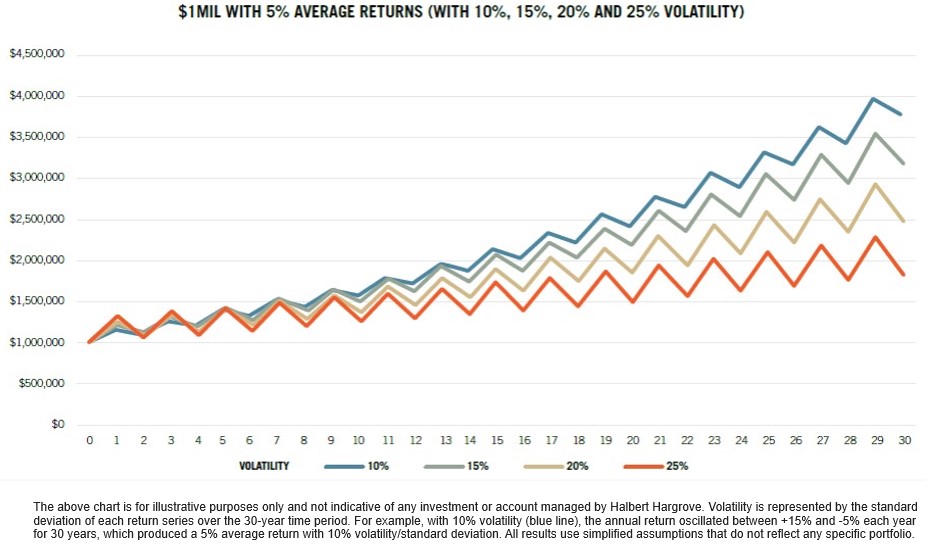
Sometimes it’s not making all the right moves but avoiding making the wrong ones that can make all the difference. Take investing, for instance. Simply avoiding making easy mistakes can be enough to give you the edge you’re looking for.
Here are some of the most common errors I see people making.
1. Investing in a brand as opposed to trusting the data.
Just because it’s from a well-known and widely respected investment manager doesn’t mean it’s a fit for your portfolio. Be sure to look at historical returns and think critically about the nature of the investment itself. Ask yourself what might put those continued returns at risk.
2. Chasing returns vs. “not losing money.”
Fortunes are made by not losing money as opposed to chasing the next big thing. Take a look at the chart below from investment firm Halbert Hargrove. All of the portfolios have a starting value of $1 million and represent an average return of 5%. The difference in all four is the volatility they experience. The portfolio with the lowest volatility has a value of $3.8 million by year 30. The portfolio with the most amount of volatility has a value of $1.8 million by year 30.

3. There’s no such thing as “risk-free investing.”
If it sounds too good to be true, it typically is. This age-old adage applies to investing as well. Much like what the salesman is trying to pitch you on, if an investment professional is trying to sell you something that seems implausible, take another look. Chances are, there’s a catch.
We’ve all heard of Ponzi schemes, get-rich-quick schemes and, of course, the pump and dump, made popular by crypto and meme stocks. It's important to thoroughly research any investment opportunity and consult with a financial professional before investing your money.
4. Following the crowd leads to buying the top (hype) and selling the bottom (fear).
There’s no better example of this in recent memory than the meme stock craziness that took hold in 2020 and 2021.
One of the most well-known examples is GameStop, a struggling video game retailer that was heavily shorted by hedge funds. A group of Reddit users from the WallStreetBets subreddit encouraged others to buy GameStop stock, causing the stock price to skyrocket. It went from trading at around $18 per share in early January 2021 to a high of over $347 per share on Jan. 27, 2021.
This sudden rise caused significant losses for some hedge funds that had bet against the stock, including Melvin Capital. The fund reportedly lost around 53% of its value in January 2021 as a result of the short squeeze.
5. Not performing your own diligence.
It’s never been easier or cheaper to take the time to self-educate. Even when it comes to sophisticated alternative investments, there are resources, like the Equi Learn page. Investment diligence includes researching the company or asset, analyzing the financials, assessing management and leadership, evaluating the competitive landscape and considering the risks.
If you’re going to rely on someone else to perform your diligence for you, then you better make sure to perform your diligence on them! Ensure they’re properly qualified and experienced to do so.
6. Taking concentration risk instead of diversifying.
Concentration risk can take a number of forms. It could be investing in one company, one sector, one geography, you name it. This is also where having a strong alternative investment portfolio becomes critical. Most public-traded investments are correlated to changes in fiscal and monetary policy — just look at what happened in 2022.
For example, if an investor holds a significant portion of their portfolio in real estate assets, they are taking on a concentration risk that the performance of the real estate market could significantly impact their portfolio's returns.
To manage concentration risk, investors can diversify their portfolio across a range of different assets, sectors and geographic regions. By spreading their investments across a variety of different holdings, investors can help to reduce the impact of any one asset or sector on their overall portfolio performance.
7. Holding too much cash.
Especially in a world where inflation is higher than historical averages, sitting on cash can harm your returns. This doesn’t mean you need to put all your liquid funds in highly volatile assets, but there are plenty of low-risk options on the market today: alternative investments, index funds, treasuries and certificates of deposit are all great options.
In fact, this is the most attractive Treasuries have been in decades, meaning there’s no excuse not to take advantage of “the world’s safest borrow.” The opportunity cost of holding cash is extremely high, so don’t let a desire for “safety” destroy your chances of compounding your wealth or losing value to inflation.
8. Failing to adjust the amount of risk in your portfolio.
What’s appropriate for my 26-year-old colleagues is not appropriate for my parents or the average retiree. As you enter new stages of life, you should rethink what’s appropriate and how much risk you can afford to take.
The younger you are, the more risk you can handle since your investing horizon is very long. But as you get closer to retirement, the name of the game is preserving capital.
9. Following the advice of gurus as opposed to thinking for yourself.
Following financial gurus can be entertaining, but I never make an investment decision based on their advice. Being rich doesn’t mean you know how to help other people get rich, and their advice makes broad assumptions about human behavior.
Always be sure to check their credentials and do research for yourself, especially if their advice falls into the “too good to be true” category.
10. Don’t let your portfolio ruin your life.
You only live once. Money is simply a tool to help you accomplish your goals in life. Don’t make the pursuit of money the goal itself, because your investing and your life will suffer as a result.
This is where a partner like Equi can help. Our platform is a tech-enabled asset manager that relies on sophisticated data and a specialized diligence team to offer portfolios of what we believe to be the top alternative investment products.
This is the most “hands-off” and streamlined approach and can save you a lot of stress if trying to avoid all of these mistakes sounds like too much to handle on your own.
Please see important disclosures for Equi (Equilibrium Ventures, LLC) at www.equi.com/blog.







